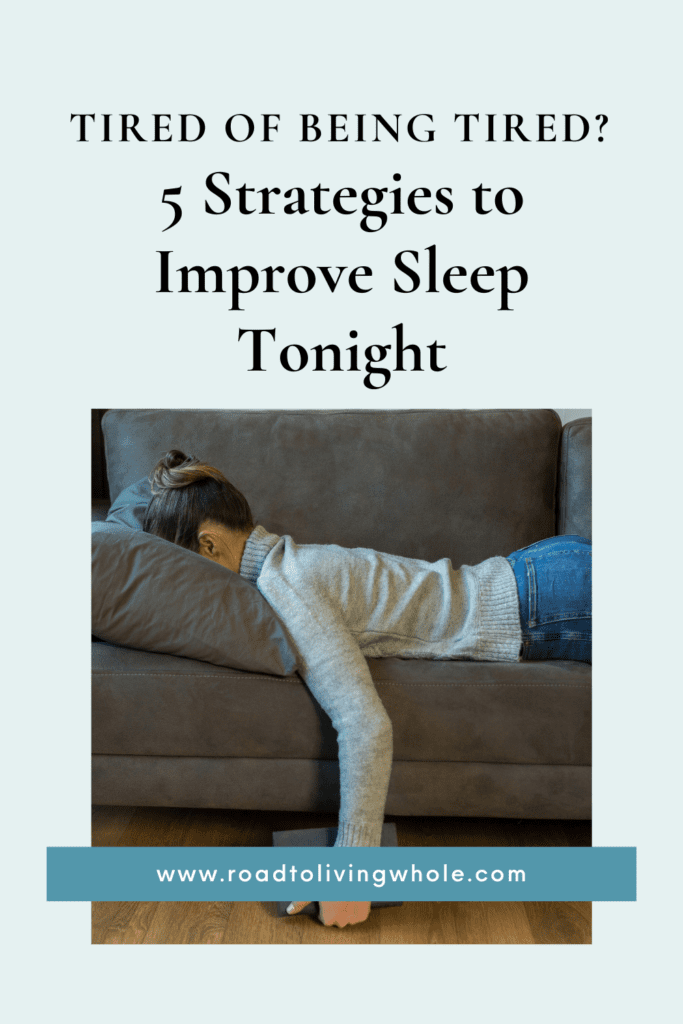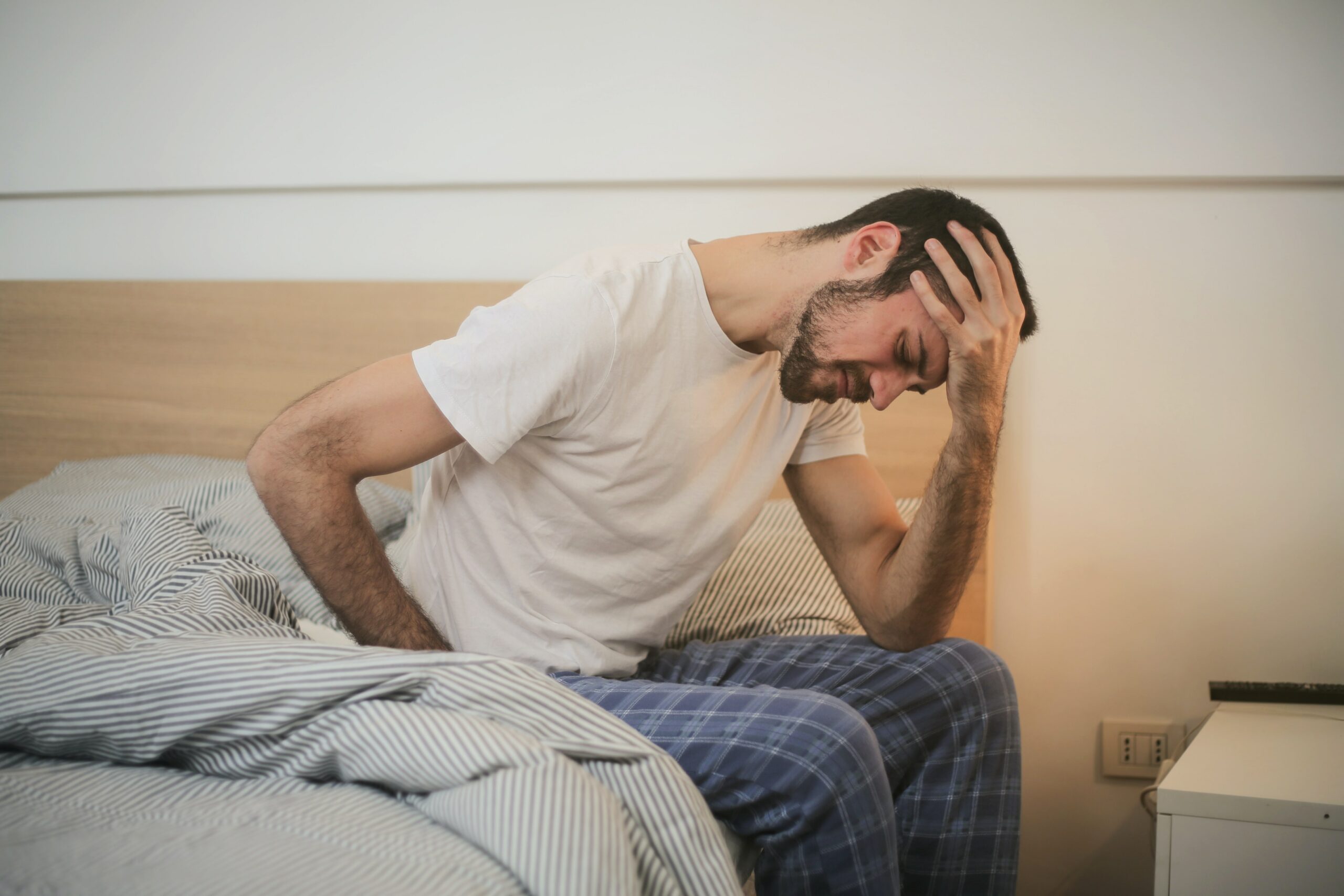I never knew how important sleep was to my emotional, mental, and physical health until I was sleep deprived for years on end. First with having young kids. Then more recently when I went through 2 years of a really stressful point in life. I remember when my kids were young I would just sit in my car alone and cry because I was so tired. Then more recently I was just a basket case. Everything felt hard. I had no stress tolerance, I was irritable, and I got sick often. It just isn’t pretty to be sleep deprived.
Then you throw autoimmune disease or chronic illness into the mix and it can really throw your health through a loop. Sleep is foundational on the healing journey. It is easier said than done. I know this firsthand. I also know 5 strategies that can help improve your quality of sleep, help you sleep through the night, and get you rested.
So often when we are dealing with autoimmune or chronic illness symptoms, sleep eludes us. It’s hard to fall asleep, stay asleep, or even if you do sleep through the night, wake up feeling refreshed. While addressing symptoms takes a holistic approach, today I’m focusing on sleep. Things that can negatively impact it and 5 strategies that have been shown to help improve sleep. The best part is you don’t have to do all 5 at once. Typically one or two things will work while others won’t make a noticeable difference. Every person is different so it’s going to be some trial and error with a dose of patience to find what helps you specifically.
First, let’s talk about what can impact our ability to fall asleep and then stay asleep.
Temperature.
The temperature in your room matters. When your room is too warm, you aren’t able to go into REM sleep. If it’s too cold, also can’t fall into REM sleep because it has to keep you warm enough to stay alive.
Bright lights all evening
In our modern world, we have the ability to keep our homes so much more bright than before electricity. Typically melatonin starts being produced as it gets dark. If you are keeping your home super bright after the sun goes down, you’re limiting your body’s ability to produce the right amount of melatonin to make you tired and ready for bed.
Blue light and technology before bed
Blue lights cause the same problem as bright lights. Blue lights from technology are similar to blue light waves from the sun. Watching TV, playing on the computer, and scrolling on your phone are interfering with your body’s ways of producing what you need to sleep well.
Lack of a wind-down routine
When we have babies, we work hard to do the same exact evening routine every night so that they know it’s time to relax and get ready for bed. For some reason, we don’t realize that we need this at all stages of life. By not having an evening routine, your brain needs signals to know it’s time to turn things off and prepare for slumber.
Lack of physical activity during the day
Exercise and its impact on sleep have been extensively studied. The results are pretty clear, exercise positively impacts the ability to fall asleep faster, stay asleep longer, and reduce daytime sleepiness/fatigue. Lack of physical activity makes us more tired during the day and negatively impacts our sleep at night.
Stress
This is a chicken or egg question when it comes to sleep. Are you feeling more stressed because you aren’t sleeping or is stress interfering with your sleep? In reality, it’s probably both. Stress led to adrenal fatigue which then made sleep harder to get. A vicious cycle that takes time to get out of.
5 strategies that can improve sleep
Make your room cool and dark like a cave.
Your room should be dark and cool like a cave. They say the perfect sleeping temperature is 68 degrees. I have opinions about this. I live in Phoenix, Arizona. If I made my house 68 at night in the summer I would be freezing and probably get sick often. In the winter I can do 68 for sure, no problem. I think what matters most is that your room is cool enough that you don’t get that stale air warmth around 2-3 in the morning.
The other thing is light. It’s essential that you don’t let the street lights and lights of the city into your room while sleeping. It will naturally wake you up. We are designed to fall asleep when it’s dark and wake up when the sun rises. Making your room dark will help you sleep throughout the night and wake up more rested.
Dimming lights and minimizing evening blue light exposure
When the sun sets, dim your house. Turn off overhead lights and use lamps. Turn off unnecessary lights. Put blue light filters on your computer, ipad, and phone screens. If you love to watch TV to unwind, invest in blue light-filtering glasses. Give your body the signals it needs to start producing melatonin and calming down your nervous system.
Establish a bedtime routine
Train your brain to get tired when you do the same set of things every night. Not only will it trigger your brain to get ready for sleep, but there’s also comfort in routine. The routine will lower stress levels in the body which in turn helps you sleep better and longer. There are lots of things you can do. My evening routine is: dim the lights, brush teeth, apply lotion, turn on my white noise machine, climb into bed, journal, turn off the light, box breathe to relax and boom, I’m asleep. The white noise is essential for me because I wake up to every little noise. Blocking out the noise of the neighborhood or my kids knocking the wall with their elbow or foot, or my dog moving around in her kennel helps me stay asleep through the night.
Add Exercise To Your Weekly Routine
Exercising just 3x a week for 30 minutes can positively impact your ability to fall asleep more quickly, sleep deeper, and for longer. Technically we’re supposed to get 30 minutes of physical activity per day. Still, if you are super intentional about 3x per week you can reap the benefits exercise provides especially regarding your sleep.
Incorporate Stress Reduction Techniques
I go deep into this in Episode 46 but I’m going to give an overview here because stress does directly impact sleep. One quick way to help you release stress before bed is to deep breathe. You can do this in a couple of different ways. You can box breathe where you breathe in for 4, hold for 4, exhale for 4 and hold for 4 and do this 4 times. Some people really like in-bed yoga which is a different form of using breathing and stretching to release stress in the body. Another great option to reduce stress is to journal. Getting all of the thoughts in your brain out helps you feel like you got it all out and can let it go.
And those are my 5 strategies to improve sleep!
Now, I get that 5 can sound like a lot. The thing is, not everything will impact everyone the same. Something might not help you at all while another one will help significantly. I recommend picking one, trying it for 2 weeks, and seeing if it helps. If it does, awesome. You can try another one or keep doing what you’re doing. I personally do all 5 of these myself but it’s not an overnight process. It’s so much better to slowly build things in so they require no thought than to try to completely overhaul your habits all at once. It’s usually not sustainable then we feel like failures and we go back to what we were doing. It’s just not the best approach in my opinion.









